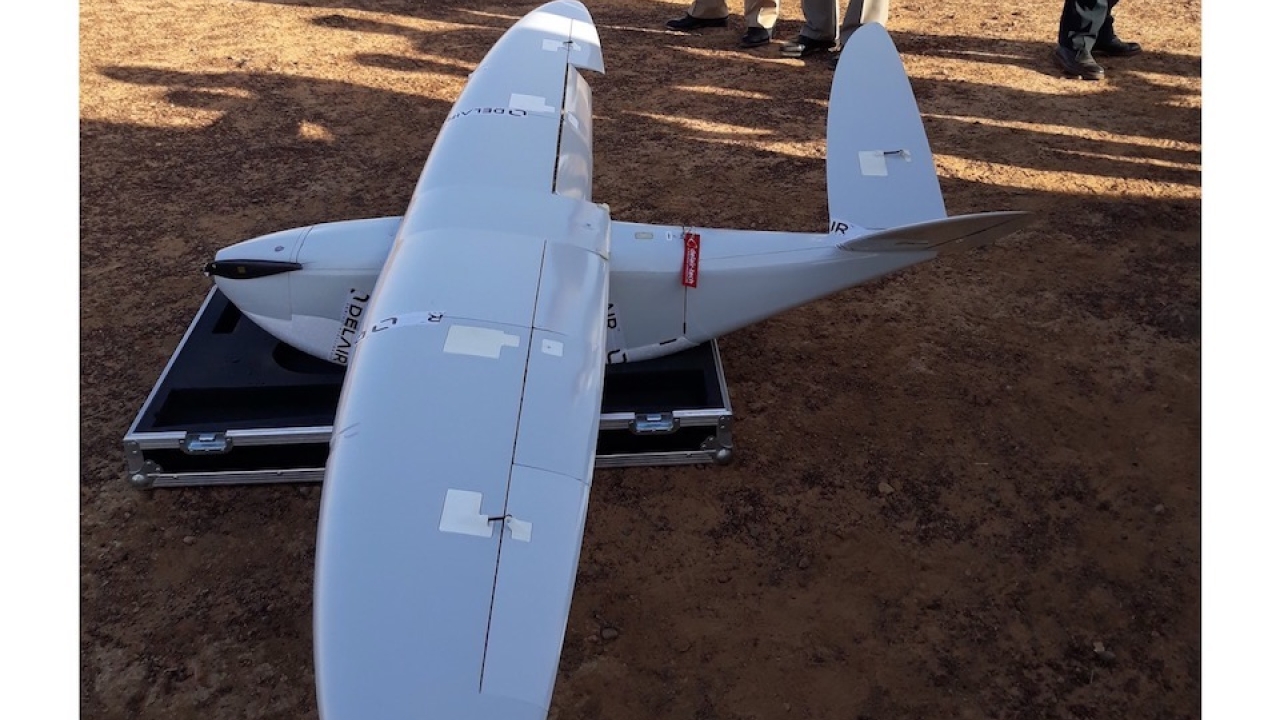The Delair force
French uncrewed air vehicle (UAV) manufacturer, Delair, has become a household name in Africa following a string of successful sales in the past decade.

Popular: The DT26, seen here in Niger, has now been acquired by Morocco and Côte d'Ivoire. Picture: DCSD.
Delair’s DT26 has found favour with several militaries and security forces in western and northern Africa over the past few years – notably the Burkina Faso Army and the Niger National Guard.
Despite the challenges presented by the Covid-19 epidemic, Delair also managed to add Morocco and Côte d'Ivoire to its customer portfolio in 2021.
The Moroccan deal covered the supply of seven DT26E UAV systems to the Royal Moroccan Gendarmerie, each comprised of one control station and two aircraft.
The French ministries of the armed forces, interior, and foreign affairs funded the purchase as part of an effort to strengthen Moroccan capabilities to counter the smuggling of illicit goods and drugs, as well as illegal immigration.
The Ministry of Foreign Affairs Defence Cooperation Directorate (DCSD) was tasked with leading the project on the French side, including selecting the provider and procuring the UAVs for Morocco.
The DT26E is the latest variant of Delair’s highly successful DT26 series and features several enhancements including a lighter weight, increased endurance, a new sensor suite and new electric systems similar to those of the smaller UX11.
The drone has an endurance of up to 170 minutes, a range of 50km and can be fitted with a gyrostabilised electro-optic/infrared (EO/IR) high-definition video camera. The footage from the sensors is relayed in real time to the ground control station, allowing optimum situation awareness.
The Moroccan contract was finalised in the first half of 2021 and was followed by an extensive testing phase, during which the aircraft was trialled to confirm its ability to operate in mountainous and closed environments under sever wind conditions. Deliveries were completed in the last quarter of the year.
The ambitious delivery tempo was driven by a gendarmerie desire to reach operational capability with the new UAVs as quickly as possible. The contract also included the training of operators, as well as maintenance personnel, with two sessions taking place throughout 2021.
Significant sustainment and maintenance support is also being provided by Delair.
The quick delivery and training allowed the gendarmerie to start flying operational sorties in the third quarter of 2021, with the aircraft proving satisfactory and performing well in adverse conditions.
Aside from the DT26s, the gendarmerie is also known to be flying small multirotor UAVs, which are primarily used in urban environments.
Côte d'Ivoire, meanwhile, has selected Delair to provide it with its first fixed-wing UAVs in nearly 20 years.
Indeed, in 2004, two Aeronautics Aerostar tactical UAVs were received by the Ivorian Air Force and used in air surveillance and reconnaissance missions against the Forces Nouvelles (new forces) combatants in the north of the country. However, following the Ivorian air strikes against the French military base of Bouaké, the French Armed Forces effectively destroyed or damaged most of the Ivorian Air Force’s inventory, include the two Aerostars. Four DT26E systems, each with one control station and two aircraft, were ordered in the second quarter of 2021 and delivered at the end of the year. Two types of payloads were also supplied: an EO/IR gimbaled turret and an electronic intelligence sensor.
Training for operators and maintenance technicians took place in-country in January 2022.
The aircraft are to be used by the Ivorian Army for surveillance and reconnaissance and will be deployed in the north, along the border with Mali and Burkina Faso.
There are growing concerns that armed terrorist groups active in both countries are trying to infiltrate into Côte d'Ivoire. Several attacks took place in 2020 and 2021, which resulted in the death of Ivorian Army and gendarmerie troops.
The DT26Es are likely to be used to conduct road reconnaissance and pinpoint potential ambushes, and improvised explosive device sites, ahead of the movement of Côte d'Ivoire troops, as well as to monitor known border crossings and the surroundings of military bases and critical infrastructure.
These recent sales are likely to lead to further exports of the DT26E throughout Africa, particularly across countries in the Sahel and the Gulf of Guinea, which are seeking to strengthen surveillance and intelligence gathering capabilities to counter the expanding range of asymmetric threats facing them.
Stay up to date
Subscribe to the free Times Aerospace newsletter and receive the latest content every week. We'll never share your email address.

